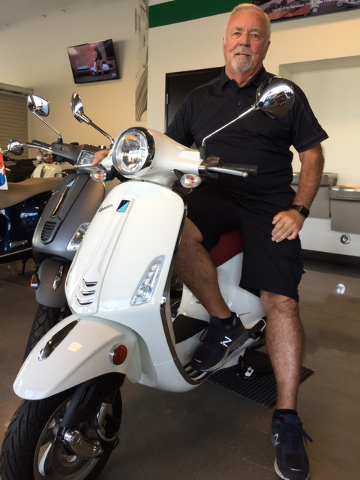Motor-driven cycles economical, energy-efficient

For the past several years, frugal Southern Nevadans have been counting on small cycles to get them around town. Scooters and mopeds are the perfect solution for those wanting inexpensive rides.
The economic recession that started eight years ago — and included skyrocketing gas prices — was far worse than what Las Vegans experienced in the early 1980s, but the uptick in sales of scooters and mopeds was similar.
Longtime Honda of Las Vegas owner Chuck Trickle said the mopeds were especially popular in the 1980s.
“We helped so many people who couldn’t afford a vehicle get to work every day,” Trickle said. “I sold 850 of them in a year for $395 apiece. They were called the Honda Spree, and they sold like hotcakes.”
Today, you can get a moped for around $1,000, and the motor-driven cycles get nearly 100 miles to the gallon of gasoline. And, until recently, mopeds did not require licenses or to be registered with the Department of Motor Vehicles in Nevada. If a moped is driven on a public street, however, owners are required to have a Class C or higher license.
Many people use the terms “moped”and “scooter” interchangeably, but there are distinct differences — especially in the eyes of the law. According to the Nevada DMV, mopeds “produce no more than 2 gross brake horsepower, have displacement of no more than 50 cubic centimeters, produce no more than 1,500 watts of power output and are capable of a maximum speed of not more than 30 miles per hour.”
In 2015, the Nevada Legislature passed Senate Bill 404 which requires a one-time registration of mopeds and becomes effective Jan. 1. License plates will be issued to owners.
Any motor scooter with a 50cc engine or larger does not meet the legal requirement of being a moped. It is considered a motorcycle and drivers must have a Class M license, registration and insurance.
The Vespa is an Italian-made scooter manufactured by Piaggio, considered the Ford or General Motors of the scooter industry. The base models can go 40 mph with gas mileage of about 85 miles per gallon, according to Mark Yuill, the owner of Freedom Euro Cycle in the southwest valley where the Vespa and Piaggio models are sold.
Piaggio models start at $1,999, while Vespas start at $3,599. Freedom Euro Cycle also carries a variety of models made by other manufacturers.
“There is a lot of competition for scooters nowadays,” said Yuill, a former National Hot Rod Association Pro Stock drag race champion from the mid-1970s until the late-1980s.
However, Yuill insists that products such as the Piaggio and Vespa models are top of the line with better warranties, factory-trained technicians, readily available parts and accessories along with service.
“You get what you pay for. Plus, you’re buying heritage and prestige by purchasing a better-known scooter,” he said.
The new Nevada requirements state that all mopeds and scooters must be taken to a DMV office for inspection to determine whether the vehicle is actually a moped or a scooter. In rural counties that do not have a DMV, the local sheriff can do the inspection although the owner will still need to register at the nearest DMV office.
Fees of $33 plus taxes will be charged on a one-time basis based on the value of the moped, according to Kevin Malone, public information officer for the Nevada Department of Motor Vehicles. The registration remains valid until the owner sells the vehicle or cancels the registration and surrenders the plate. Helmets and insurance are not required.
Malone said the new law was being utilized to deter moped theft.
“The owners of mopeds oftentimes cannot prove ownership,” Malone added. “The whole purpose of the bill was to deter theft and help establish ownership of the vehicles.”
Nevada State Sen. Mark Manendo was one of the co-sponsors of the bill. He serves on the Senate State Transportation Committee.
“Theft of mopeds is out of control,” said Manendo, who has served a combined total of 22 years in the Assembly and the Senate. “If your moped is stolen, this gives you an avenue to recover your loss. Just like your car, you now have proof of registration. It’s good consumer protection.
“Metro has been pushing this for a long time. In addition, moped riders are using the roads, so a portion of the registration money goes to maintaining the roads. It’s especially important that the roads are kept safe when talking about those who ride mopeds.”
Yuill did say that he wished there were stronger laws regarding safety for scooters and mopeds, especially when it comes to wearing helmets.
“I absolutely support what the DMV is doing,” Yuill said. “The rules have been too lax as it relates to riding mopeds or scooters.”
Furthermore, Yuill said, too many operators of the vehicles attempt to ride them in areas where they should be forbidden.
“Many of the streets in Las Vegas are too fast for a moped or a scooter,” Yuill said. “That’s a common complaint, for sure.”








